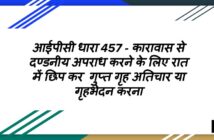Section 341 IPC
Our Constitution has guaranteed every citizen a right to freely move throughout the territory of India under Article 19 (1)(d), and this right cannot be taken away by anyone. Therefore, the Indian Penal Code has ensured that the freedom of movement and personal liberty of a person is not deprived.
This article will discuss wrongful restraint, the object of Section 341 of IPC, the essential ingredients and exceptions of Section 341 of IPC, is it bailable, the punishment under section 341 of IPC and the difference between wrongful restraint and wrongful confinement.
What is wrongful restraint? सदोष अवरोध (Hindi)
Wrongful restraint is defined in Section 339 of the Indian Penal Code (IPC) as obstructing or restraining a person from moving from one place to another where he/she has the right or wish to go. In other words, the person has the right to proceed, but they are being obstructed from going there.
Under Section 341 of IPC, if a person wrongfully restraints or prevents a person from going from one place to another where they have the right to go shall be punished.
The object of Section 341 of IPC
The main objective of Section 341 IPC is to enforce the provisions under Articles 19 and 21 of the Indian Constitution. Both the articles guarantee freedom of movement and the right to personal liberty to the citizens.
Essential ingredients of Section 341 of IPC
The essential ingredients to constitute an offence under Section 341 of IPC are:
- The person should be prevented from going or moving to any place where they have the right to proceed.
- The act must be committed voluntarily.
- The obstruction need not be physical, and even a mere threat can restrain a person from moving
- There must be an intention of preventing a person from moving to a particular direction or place.
Example:
A and B have a house in the same compound. A locks the main entrance, thus, restraining B from entering the compound. Then, A will be liable for wrongfully restraining B from entering the house.
An exception to wrongful restraint
A person is not liable for wrongful restraint if that act is done in good faith and the person believes himself to have a right to obstruct another person. Then, in such a situation, the person obstructing is not liable for any offense. In addition, if the person does not have a right to proceed, he cannot be wrongfully restrained.
Example:
A stops B’s car on a highway to prevent him from going ahead as there was land sliding ahead. Then, in such a situation, it does not constitute wrongful restraint.
Ms. Vijay Kumari Magee Vs. Smt. S. M. Rao and Others, 1996
In this case, the teacher (Appellant) stayed in the hostel even after the expiry of the term, so the respondent had locked the room to obstruct the Appellant from entering the room. The Court held that the respondent has the right to restrain or object to the complaint from entering the hostel room as the license term has expired, and the Appellant is a trespasser. Therefore, the respondent’s act does not constitute wrongful restraint.
Is section 341 of IPC bailable?
The offence under Section 341 is cognizable – bailable, and triable by any Magistrate.
What is the punishment for wrongful restraint?
Any person who wrongfully restraints a person shall be punished under Section 341 of IPC with simple imprisonment for one month or a fine up to Rs. 500 or with both.
Difference between wrongful confinement and wrongful restraint
Wrongful restraint means obstructing a person from moving from one place to another where that person has a right to proceed. Example: A locks B’s house; preventing him from entering the home is wrongful restraint.
Whereas wrongful confinement means obstructing a person from going beyond a certain limit. Example: A locks B into the house; preventing him from getting out of the house is wrongful confinement.
Conclusion
Any person who wrongfully restraint a person from moving from one place to another shall be punished under Section 341 of IPC for a term which may extend to 1 month or with a fine up to Rs. 500 or with both. Mere restraining a person from moving does not amount to wrongful restraint. The person should have a right to proceed to such a place where he is prevented from going. सदोष अवरोध (Hindi)


